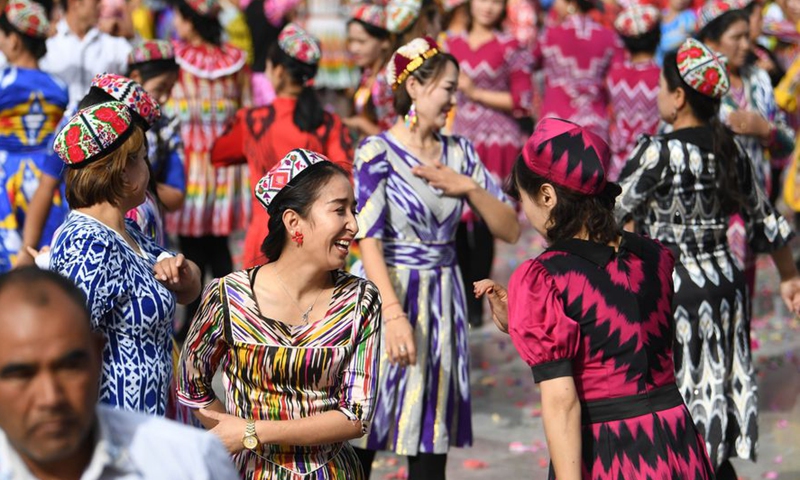
People dance at a square during a culture and tourism festival themed on Dolan and Qiuci culture in Awat County of Aksu Prefecture, northwest China's Xinjiang Uygur Autonomous region, Oct. 25, 2019.Photo:Xinhua
As the West is exploiting Xinjiang governance to stir up trouble for China, Western opinion is closely facilitating this process.
In late February, French professor from the University of Strasbourg Christian Mestre stepped down from his post as the ethics officer of the Strasbourg Eurometropolis. Besides his academic relations with China and his alleged service for China, French media outlets dug out his opinion in 2019 when he attended an international seminar on counter-terrorism, de-radicalization and human rights protection in Xinjiang. He praised China's counter-terrorism and de-radicalization measures in Xinjiang in an interview, and called for France and other European countries haunted by terrorism to adopt Chinese measures.
In recent years, some Western governments and the media outlets of those countries have stepped up efforts to pressure China by vilifying China's Xinjiang policy. What happened to Professor Mestre shows that Western public opinion manipulated by elites won't bear any voices different from narratives it constructed about Xinjiang. In 2019, a documentary released by China's national broadcaster CGTN on the anti-terrorism work in Xinjiang was identified by the YouTube community as inappropriate or offensive to some audiences.
Western media propaganda against Xinjiang governance is a composition of lies, loopholes and fabrication. These media outlets deliberately twist or make up facts and selectively report on whatever caters to their rhetoric. By playing with double standards, they control the discourse power and filer the opinions they dislike.
The fixed Western mentality determines their rhetoric, and the human rights card is the easiest and cheapest tool in the Western opinion sphere. Western media would not try to understand, or they just deliberately turn a blind eye to, the fact that Xinjiang governance is not about human rights but a matter of counter-terrorism and anti-secession.
After all, Western opinion sphere is a platform through which Western forces interfere in China's internal politics and impose so-called international pressure on China in a bid to squeeze China's room for development and maintain their own global ambitions and geostrategic interests. The rights and welfare of people in Xinjiang are never in the minds of these forces whose actual agenda is to make trouble for China and jeopardize China's development.
The West treats China with a twisted mentality, which prevents it from having a correct view of China's practices. China's policies in Xinjiang are an exploration of how to eradicate terrorism, extremism and radicalization. These evils know no boundary and threaten the stability of many countries, including European ones. China's governance in Xinjiang has prevented violent terrorist attacks in Xinjiang and brought peace and development back to the region. This is what all ethnic groups in Xinjiang are willing to see. China will not be led by the nose by the Western opinion war.
Professor Mestre's opinion that "France and other European countries [haunted by terrorism] could take the answers given by Xinjiang" back in 2019 was not to please China, but an earnest suggestion for the West. Western societies also face the baffling issue of religious extremism and have suffered from bloody terror attacks. In 2020 alone, nine cases of terror attacks occurred on French soil. The Western world, including France, could learn from China's experience. But as the West spares no efforts to crack down on China by exploiting Xinjiang governance, it may eat the bitterness itself at the end.




